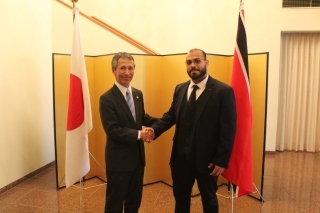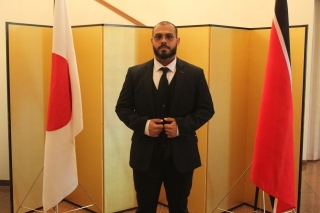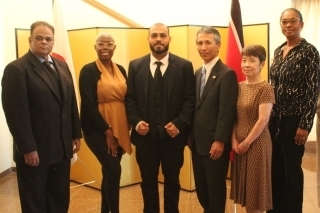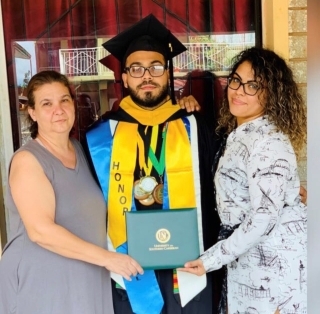2024 MEXT Scholarship Student at Tohoku University – Trent Gopaul
2024/4/19



2024 MEXT Scholarship Student at Tohoku University – Trent Gopaul

My name is Trent Gopaul, I am from St. Joseph, Trinidad and Tobago. My love for science began at an early age, simply through watching science fiction movies with my father. While most of these were fictitious, they stemmed from basic scientific concepts which I would dedicate myself to learning through my years of schooling.
For as long as I can remember I have always held a deep-seated interest in the sciences, more specifically in the fields of human medicine, molecular biology, microbiology and genetics. It has always been my goal to study these fields of science in an attempt to identify possible novel cures or treatments for neurodegenerative diseases such as Alzheimer’s Disease (AD), Parkinson’s disease and prion-related diseases. In an attempt to actualize this goal, I pursued a bachelor’s degree in Biology with a Biomedical emphasis and a minor in Chemistry at the University of the Southern Caribbean (USC).
As I progressed through university I learnt more about these destructive diseases, and the more I knew, the more determined I became to achieve my goal. That determination has brought me here, as an awardee of the 2024 Monbukagakusho (MEXT) Scholarship. This scholarship provides me with an opportunity to contribute to the research that is dedicated to saving and improving the lives of many, inflicted with neurodegenerative diseases.
Specifically, my research is aimed at investigating the expression profiles and functional roles of long non-coding RNAs (lncRNAs) within neurons of certain parts of the brain, with a specific focus on their impact on synaptic plasticity in AD. By investigating the role of lncRNAs in synaptic plasticity and AD, this study will contribute to our understanding of the molecular mechanisms underlying this disease. The identification of specific lncRNAs and evaluation of their impact on AD markers and cognitive performance in animal models can lead to the development of innovative therapeutic interventions. Ultimately, this interdisciplinary research has the potential to enhance healthcare and improve the quality of life for individuals affected by AD and possibly other neurodegenerative diseases globally, while also making valuable contributions to the field of Molecular Biology and paving the way for future scientists.
Fortunately, I have been accepted by Tohoku University, which according to Times Higher Education is ranked as the best university in Japan for the year 2023. With their advanced and vast array of laboratory equipment and brilliant minds to guide me, I believe my research will be in the ideal environment to flourish.
In addition to my research focus, efforts will be made to engage with communities in both Japan and my home country of Trinidad and Tobago, concerning neurodegenerative diseases. This may involve educational outreach programs, workshops, or seminars aimed at raising awareness and understanding about neurodegenerative diseases and the role of lncRNAs. By sharing the research content and insights gained, the study aims to contribute to existing bodies of knowledge and encourage dialogue and collaboration between researchers, healthcare professionals, and the global public.
I am truly grateful for this opportunity as it brings me a lot closer to achieving my goal. I am also extremely excited to learn more about Japanese culture, learn the language and experience the country first-hand.
MEXT Scholarship Series: 2024 MEXT Scholarship Student at Tohoku University (Japanese Embassy Facebook)
MEXT Scholarship Series Archives
For as long as I can remember I have always held a deep-seated interest in the sciences, more specifically in the fields of human medicine, molecular biology, microbiology and genetics. It has always been my goal to study these fields of science in an attempt to identify possible novel cures or treatments for neurodegenerative diseases such as Alzheimer’s Disease (AD), Parkinson’s disease and prion-related diseases. In an attempt to actualize this goal, I pursued a bachelor’s degree in Biology with a Biomedical emphasis and a minor in Chemistry at the University of the Southern Caribbean (USC).
As I progressed through university I learnt more about these destructive diseases, and the more I knew, the more determined I became to achieve my goal. That determination has brought me here, as an awardee of the 2024 Monbukagakusho (MEXT) Scholarship. This scholarship provides me with an opportunity to contribute to the research that is dedicated to saving and improving the lives of many, inflicted with neurodegenerative diseases.
Specifically, my research is aimed at investigating the expression profiles and functional roles of long non-coding RNAs (lncRNAs) within neurons of certain parts of the brain, with a specific focus on their impact on synaptic plasticity in AD. By investigating the role of lncRNAs in synaptic plasticity and AD, this study will contribute to our understanding of the molecular mechanisms underlying this disease. The identification of specific lncRNAs and evaluation of their impact on AD markers and cognitive performance in animal models can lead to the development of innovative therapeutic interventions. Ultimately, this interdisciplinary research has the potential to enhance healthcare and improve the quality of life for individuals affected by AD and possibly other neurodegenerative diseases globally, while also making valuable contributions to the field of Molecular Biology and paving the way for future scientists.
Fortunately, I have been accepted by Tohoku University, which according to Times Higher Education is ranked as the best university in Japan for the year 2023. With their advanced and vast array of laboratory equipment and brilliant minds to guide me, I believe my research will be in the ideal environment to flourish.
In addition to my research focus, efforts will be made to engage with communities in both Japan and my home country of Trinidad and Tobago, concerning neurodegenerative diseases. This may involve educational outreach programs, workshops, or seminars aimed at raising awareness and understanding about neurodegenerative diseases and the role of lncRNAs. By sharing the research content and insights gained, the study aims to contribute to existing bodies of knowledge and encourage dialogue and collaboration between researchers, healthcare professionals, and the global public.
I am truly grateful for this opportunity as it brings me a lot closer to achieving my goal. I am also extremely excited to learn more about Japanese culture, learn the language and experience the country first-hand.
MEXT Scholarship Series: 2024 MEXT Scholarship Student at Tohoku University (Japanese Embassy Facebook)
MEXT Scholarship Series Archives
